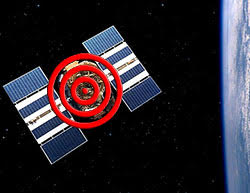NASA Testing Hardware to Help Remedy Looming GPS Vulnerably Issues Before It's Too Late
 It's a rather sad time when NASA, out of all government agencies, must step in to fend off hackers who may utilize and leverage vulnerabilities within GPS navigation systems.
It's a rather sad time when NASA, out of all government agencies, must step in to fend off hackers who may utilize and leverage vulnerabilities within GPS navigation systems.
Apart from the amazing feats that come out of NASA, the National Aeronautics and Space Administration or what we all know as the administration that put men on the moon and launch the most powerful rockets and machinery in existence into space, is being forced to test new hardware that fights off hackers. Causing such an action is the discovery of GPS vulnerabilities.
GPS Systems continue to lack a large-scale backup or protection system against hacking
GPS, the global positioning system, is a heavily relied on system that countless devices on earth count on to fundamentally keep the world "spinning". While that "spinning" isn't in the literal case of earth rotation, it is however essential to keep GPS devices coordinated and in sync to deliver the proper data necessary for a myriad of tasks. Multiple GPS satellites all have their task of delivering GPS data to devices such as cars, smartphones, airplanes, military equipment, and even devices that may interact to save lives.
In knowing that hackers could one day virtually attack GPS systems and interrupt their service is not something that the world wants to experience. Life, as we know it would slow to a crawl and countless lives could be in danger. Just think, we could see planes fall from the sky, record-breaking car pileups on major highways, and an immeasurable amount of "lost" people because their smartphone or navigation device stopped working. Hackers may one day create sophisticated malware designed to attack various GPS systems and other essential systems run by governments around the world.
There has never been a serious effort to backup GPS systems in the U.S. despite some actions set in motion back in 1997 by President Bush called eLoran, which later met its demise in 2008 partly due to the economic downturn. However, eLoren or a similar notion to backup and help fortify GPS systems could be jumpstarted under the Trump administration, especially with announcements of the new Space Force effort where there may be a need to help "guide" such an agency's new tasks.
NASA continues to take on multiple roles for the better of humanity
For now, GPS remains to be vulnerable and NASA has stepped in to help ensure that the vulnerabilities that may lead to spoofing, which is a practice of sending fake signals to lead GPS devices off of their intended course. The hardware being tested by NASA is comprised of a palm-sized Pyramid GPS SP device from the cyber security tech firm Regulus Cyber Ltd. The device would utilize a bundle of antennas and receives to ensure GPS signals are legitimate and can be trusted. Essentially, such a device triangulate GPS signals and send an alert if the signal is sent in the wrong directions, which would be an indication of suspicious signals or hacking.
NASA has been testing the device to thwart hacking attacks on GPS for some time and Regulus is in talks with car makers and drone manufacturers to carry out additional tests. Their aim is to bring such a device to market in 2019 in an effort to protect against GPS spoofing.
If ever GPS spoofing from hacking cases ever became a serious-enough issue, we would see the future of driverless vehicles come to a screeching halt, in a literal sense. Hackers are so creative and relentless nowadays that the chances of hacking GPS systems or devices is suspected to be at an all-time high. It only makes perfect sense to be proactive about protecting our GPS systems before hackers have a chance to pounce and let their destructive roar be heard across the globe virtually shutting down the operational features for devices that are heavily relied on for everyday life to carry on without stumbles.